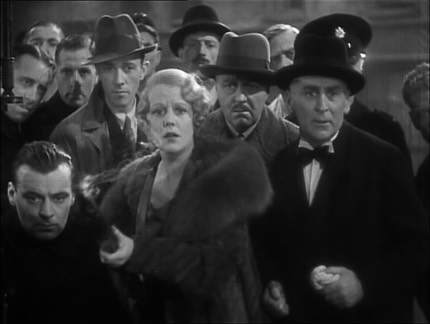“Why listen lady,” he said with a grin of delight, “the monks of old slept in their coffins!”
“They wasn’t as advanced as we are,” the old woman said. (From “The Life You Save May Be Your Own”, in The Complete Stories of Flannery O’Connor, Hardcover, 17th edition, FS&G 1981, page 149.)
G.K. Chesterton once wrote a poem about evolution. Its refrain went something like this: “Evolution – up, up, up/Evolutes us on, on, on”. Similarly, C.S. Lewis compared evolution to a sailor climbing the rigging of a sinking ship. My point isn’t that evolution is false. On the contrary, it is as solidly proven as a scientific theory can be. Evolution certainly happens. And so does progress. But evolution is full of turning back and cross breeding and dead ends, and progress is very far from linear. It’s a serious mistake to think that, just because people lived before us – say, a generation or so – we are more advanced than they are.

( Fierce mother with smoking gun, 1934-) (This image is taken from the 1934 "Man Who Knew Too Much", and you can find it and other stills from the film here.)
To take just one example, let’s look at scenes from two films, the early and later versions of Alfred Hitchcock’s “The Man Who Knew Too Much”. One was set in London and Switzerland in the 1930s; the other is a remake from the 1950s, this time set in London and North Africa. Both, of course, are fine films, and there are some commonalities in the plot. Each film contains a scene toward the end in which the mother reaches out to her child. These scenes, however are strikingly different.
In the first film, a little girl of 12 or 13 takes her fate into her own hands and tries to escape her kidnappers by climbing out onto the roof. It is her mother, an expert sharpshooter, who snatches a gun from a hesitant policeman and kills the villain threatening her daughter.
The mother’s role in the 1955 film is quite different. She, too, acts to help her child. But, rather than actually rescuing him, she sings to him. The song, of course, is “Que Sera, Sera”, and it might be worth looking at the words. “When I was just a little girl, I asked my mother, ‘What will I be? Will I be famous? Will I be rich? Here’s what she said to me. (Chorus) Que sera, sera. Whatever will be, will be. The future’s not ours to see. Que sera, sera.’ And in the second verse, the little girl asks, “What will I try? Will I paint pictures? Will I sing songs?” Again, her mother tells her, “Que sera, sera.”
So we have a comparatively passive (though talented) mother singing a song to her child. And the song, in essence, celebrates the passivity of women. A child is told not to plan or worry for her future, for whatever will be, will be. What a contrast to the earlier movie, when a little girl crawls out of a window and onto a roof in order to try to rescue herself! And, again, it’s her mother who completes the rescue by shooting the criminal who’s threatening her child.
In the 1930s, Hitchcock shows us an active, capable woman and child. In the 1950s, he presents a passive child and a mother who sings him a song that seems to celebrate passivity. Is this progress? Whatever happened to make the picture of women (and children) so much more regressive in the later film?
The answer is fairly obvious. World War II happened. In that war, young women drove trucks, worked in factories, grew crops, and flew planes, among other things. They did “men’s work”, and found they could do it well. Once the war was over, and the men returned, women had to be pushed back into the home. As I said at the beginning of this blog, progress is not linear. People who lived before us may have been, in some ways, more advanced than we are.
And what is true of sexism and feminism is equally true of racism. It seems to me racism is alive and well all over the world. The gains of the 1950s and 1960s won’t be retained unless we work to retain them. Progress isn’t automatic. In our struggle to become more humane, we fall back from time to time. And I think it’s common to fall back after making some forward strides.
It’s precisely this, I think, that can make the myth of progress dangerous. It’s far too easy to assume that we have solved problems, and that therefore they will stay solved, once and for all. That simply isn’t so. Like charity, compassion, forgiveness, humanism, and so many other good things, social progress has to be fought for every day. We all have to keep fighting for it, or we will neither gain nor retain it. If we simply assume that, of course, we have achieved equality, we may find ourselves falling backwards, just as we did after WWII.
What do you think? Is progress a myth? And, if it is, is it a dangerous myth? I look forward to your comments.
